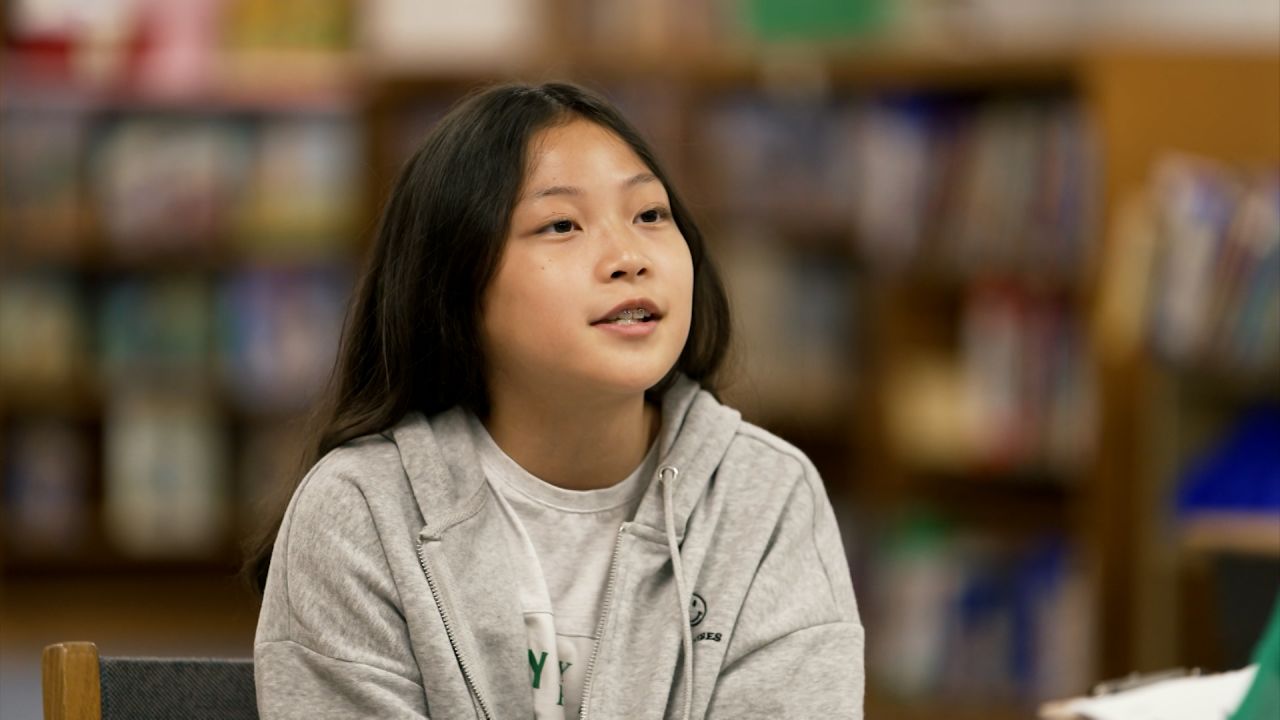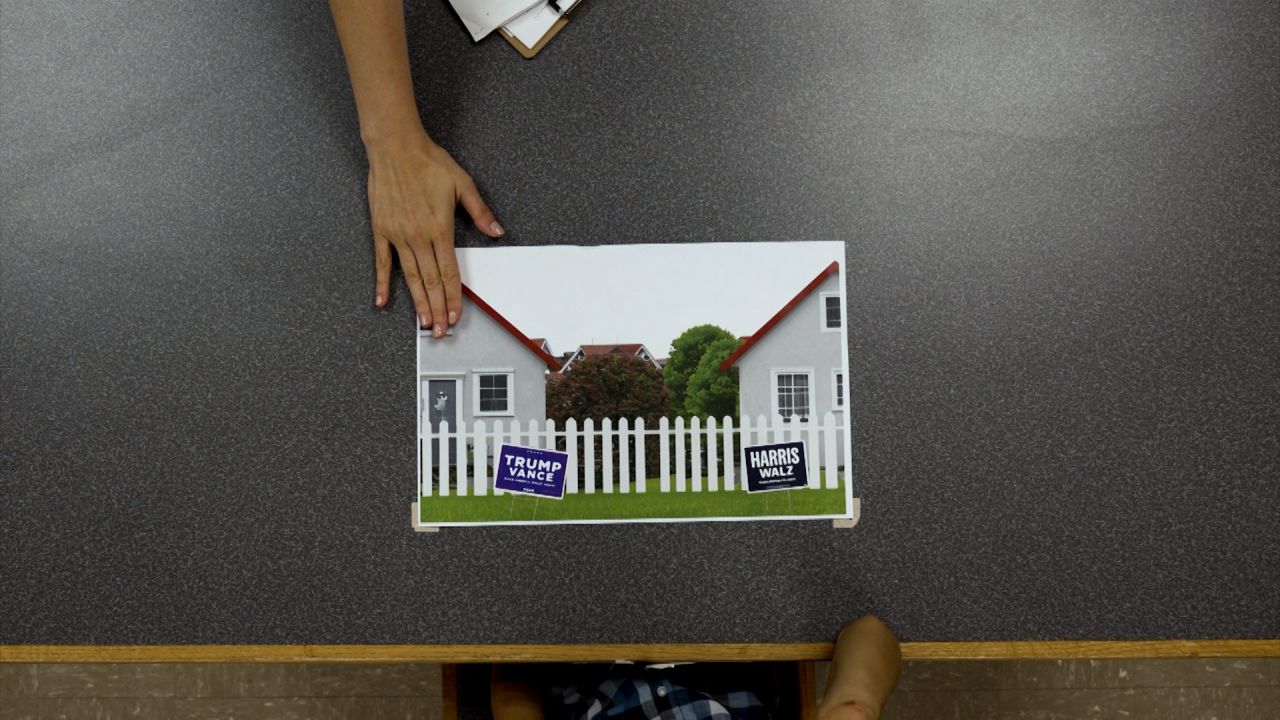A version of this story appears in CNN’s What Matters newsletter. To get it in your inbox, sign up for free here.
CNN
—
It is jarring to hear American kids talk about politics and see the country’s often angry political debate filtered through young people.
When a child is asked for one word to describe former President Donald Trump and comes up with “pure evil,” it suggests a level of division that might surprise the average American.
Researchers found that Democrat-supporting kids drove polarization in a new study for CNN, and the children were more likely to say they wouldn’t be friends with someone who supports Trump. Kids in red states, on the other hand, were more likely to repeat misinformation.
The findings are the result of more than 40 hours of interviews commissioned by CNN’s “Anderson Cooper 360” to talk politics with 80 elementary schoolers in Arizona, a 2024 battleground state; New Jersey, a blue state; and Texas, a red state.
With their parents’ OK, researchers got the kids’ unfiltered thoughts about the presidential candidates and the election.
CNN is not identifying the students or the schools visited, and this is not a representative public opinion poll, but rather a set of interviews designed to gauge polarization in children.
For this project, Asheley Landrum, an assistant professor, child development expert and media psychologist at Arizona State University, worked with Stanford University political science professor Shanto Iyengar, who has already studied polarization in American teens. Landrum asked the elementary schoolers a series of questions, using photographs and visual prompts, to understand how the children feel about the political system.
The questions about the presidential candidates included prompts asking which one would keep them safer, which is more honest and which is more likely to do bad things.
The interviews were first conducted in the spring, when President Joe Biden was running for reelection and the kids were in fourth grade. Most of the same children took part in follow-up interviews in the fall in New Jersey and Texas, after Vice President Kamala Harris had stepped in to be the Democratic nominee and the kids had started fifth grade.
Most of the children in the fall interviews, nearly two-thirds, supported Harris. There was an even split in Texas, a major improvement for Democrats in the red state compared with when Biden was in the race. Nationwide polls of likely voters suggest a much tighter race for the White House and a lead for Trump in Texas.
Democrat-leaning kids drove polarization

In September, according to an analysis prepared by Landrum, when kids were asked how much they liked Harris or Trump on a five-point scale, the Democrat-leaning and blue-state kids were more likely to say they really liked Harris and really disliked Trump. Republican-leaning and red-state kids liked Trump but were neutral or even positive about Harris.
When Landrum asked for one word to describe a candidate, the results for Trump ranged from positive – such as from one kid in May: “Go America!” – to extremely negative. There were criticisms of Harris too. “Liar” was one child’s one word to describe her.
Back in May, “three Biden-leaning kids spontaneously brought up Hitler when talking about Donald Trump,” according to Landrum’s analysis.
More negative feelings about Trump among Democrat-leaning kids
In May, when the race was between Biden and Trump, kids were asked to select an emoji that corresponded with their feelings about a candidate. Only a quarter of the Trump-leaning kids selected an emoji signifying that Biden makes them feel nervous or worried, but more than half of the Biden-leaning kids selected that emoji when asked about Trump. That imbalance grew when interviews were repeated in September and the kids were asked about Trump and Harris.
Iyengar was surprised by this overall finding of the study.
“Among adults, the usual result is that Republicans are the more hostile toward Democrats than vice versa,” he said. “It suggests something about the cast of characters in this race, i.e., Kamala Harris is relatively unknown and therefore people do not have … a lot of extreme views, either positive or negative, towards her.”
Trump, on the other hand, “is an established trigger,” Iyengar said, and blue-state kids “have assimilated what their parents are telling them, and they’re pretty hostile to him.”
There were also many positive responses, such as the girl who selected the happy emoji for Biden because the president supports women’s rights and said, “And I’m a woman.”
Trump-leaning kids acknowledged the former president’s shortcomings with some interesting justifications. One boy argued that George Washington and Thomas Jefferson were both slave owners, “a really bad thing, but they still had two terms.”
“So I think, even though Trump has done bad stuff, he still deserves to run for president,” the boy said.
That same boy, in September, also expressed the difficulty of choosing between Harris and Trump when, presented with photos of the two candidates, he was asked which is more likely to do bad things.
“Convicted felon against a liar,” he said. “Who do I pick?” He ultimately decided that Trump, the convicted felon, is more likely to do bad things but it’s OK for a felon to be president.
Kids think the country is ready for a woman of color to be president




